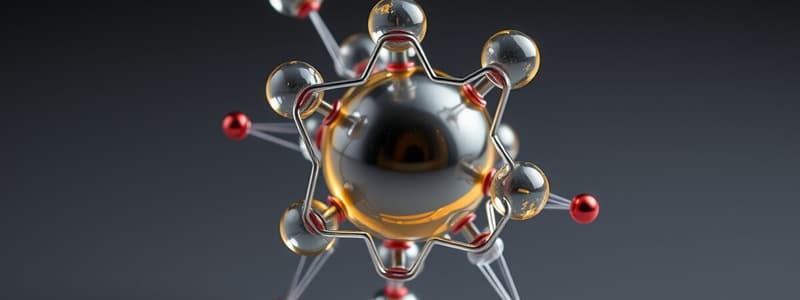Podcast
Questions and Answers
What explains the definite size and shape of solids?
What explains the definite size and shape of solids?
- Particles are closely packed. (correct)
- Particles are widely spaced.
- Particles are highly compressed.
- Particles are loosely packed.
What characteristic of gases explains their high compressibility?
What characteristic of gases explains their high compressibility?
- Particles are in a fixed position.
- Particles vibrate quickly.
- Particles are tightly bound together.
- Particles are separated at greater distances. (correct)
In what medium can sound NOT travel?
In what medium can sound NOT travel?
- Empty space or vacuum (correct)
- Liquid
- Gas
- Solid
What evidence indicates that sound travels through liquids?
What evidence indicates that sound travels through liquids?
Why is sound heard during a fireworks display delayed?
Why is sound heard during a fireworks display delayed?
Flashcards are hidden until you start studying
Study Notes
Particle Model of Matter
- Solids consist of closely packed particles, resulting in a definite size and shape.
- Liquids have particles that are slightly apart, allowing them to take the shape of their containers.
- Gases are composed of particles separated by greater distances, which means they have no definite size or shape and are highly compressible.
Sound Transmission
- Sound is generated by the vibration of particles and can travel through solids, liquids, and gases.
- Sound cannot propagate in a vacuum or empty space, as there are no particles to vibrate.
- In outer space, where particle density is extremely low, sound cannot be heard.
Evidence of Sound Travel
- Ancient tribes placed ears on the ground to detect sounds of intruders, demonstrating sound travel through solids.
- Children use makeshift telephones made from cans and string, showing sound can travel through string (a solid).
- Dolphins are known to respond to sounds traveling through water, indicating effective sound transmission in liquids.
- Sounds made in a swimming pool, such as tapping at the bottom, can be heard, illustrating sound travel underwater.
- Communication in air relies on the movement of sound waves through gases.
Delay of Sound
- The delay in sound heard during fireworks is attributed to the distance sound waves must travel before reaching the observer.
Studying That Suits You
Use AI to generate personalized quizzes and flashcards to suit your learning preferences.




